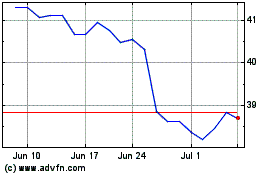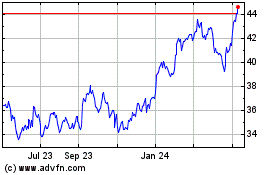By Denise Roland and Joann S. Lublin
As GlaxoSmithKline PLC's search for a new boss gets under way,
one requirement ranks high on investors' wish lists: someone who
can breathe new life into its drug-development machine.
The company's pharmaceuticals arm, which develops prescription
medicines and accounts for around two-thirds of its GBP23.9 billion
($34 billion) annual revenue, has lagged behind many of its peers
in recent years, according to investors. Glaxo has notched a total
shareholder return of 60% over the past five years, compared with
107% for the S&P Global 1200 Health Care Index. For many,
fixing this is seen as the top priority for the successor to Chief
Executive Andrew Witty, who recently announced plans to retire next
March.
The U.K. company has made recent efforts to highlight promising
medicines in its labs, which it says could yield 20 new drugs by
2020. In November, Mr. Witty and other executives walked investors
through Glaxo's pipeline of new drugs at the company's first
so-called R&D day for more than a decade. The company is also
upbeat about the prospects for some recently launched medicines in
HIV and respiratory conditions.
But a number of high-profile failures in recent years, including
darapladib, a heart drug it hoped would become a
multibillion-dollar blockbuster, and MAGE-A3, an experimental
treatment for lung cancer, have hurt the company's credibility in
research and development, according to some investors.
"The research and development organization of Glaxo is
recovering from several painful and high-profile historic
failures," said Andrew Baum, an analyst at Citi. "It needs someone
to inject a note of confidence and smart risk-taking."
At the same time, Mr. Witty's strategy of reducing Glaxo's
exposure to drug development by bulking up in vaccines and
drugstore staples, from over-the-counter remedies to toothpaste,
has raised concerns that the company is moving away from its
historic core.
Neil Woodford, a prominent U.K. fund manager and one of Glaxo's
biggest investors, is one shareholder pressing for the company to
focus squarely on developing and selling drugs. "He wants it to be
a pharmaceuticals company," said a spokesman for the fund manager.
"He's not in the consumer health-care camp."
Joe Walters, manager of Royal London Asset Management's UK
Income With Growth Trust, which holds 0.8% of Glaxo, said it is
important the new boss "comes with a strong scientific background"
because a new blockbuster drug is the company's best chance for
increasing its share price. "Science is still the largest part of
the group and will determine its success or failure," he added.
"I would prefer somebody who has had some experience of R&D
and who can make good long-term calls," said another institutional
investor. "Those calls don't show up in yearly earnings but help
sustain the business over time."
Another issue confronting Glaxo's new boss: deciding whether to
break up the group, which was formed in 2000 by the merger of
crosstown London rivals. Some shareholders, led by Mr. Woodford,
have said spinning off the GBP6 billion consumer health-care arm
could release value for shareholders.
For Mr. Woodford, that means hiring "a fresh pair of eyes" from
outside Glaxo, a move which that would be a departure from the
company's tendency to promote insiders to top jobs. The company's
12 executive team members have an average tenure of 16 years, and
eight were promoted from inside.
Mr. Witty has said that while the consumer health-care unit is
large enough to constitute a stand-alone company, it would be
"unwise" to consider breaking it off until Glaxo finishes
integrating a recent deal with Novartis AG, a process that he said
would take another two years.
Some shareholders pointed to Glaxo's U.K. rival AstraZeneca PLC
as an example of how a research culture can be overhauled from the
top. Pascal Soriot, who was hired from Roche Holding AG in 2012,
has "reinvigorated the R&D engine and brought in new talent,"
said Dani Saurymper, manager of the AXA Framlington Health
fund.
The Glaxo board last month said it would consider internal and
external candidates to succeed Mr. Witty, who has spent more than
30 years at the company and is leaving at the age of 52. Under the
company's remuneration policy, the board may offer external
candidates a bonus of up to nine times' base salary for long-term
performance as a joining incentive.
One outsider in the running is Geno Germano, a departing Pfizer
Inc. executive, according to several people close to the situation.
A spokesman for Glaxo declined to comment on the matter.
In early February, Pfizer said Mr. Germano, group president of
its global innovative pharmaceuticals business, would leave the
giant drugmaker. His exit was announced along with the leadership
plans for Pfizer's now-abandoned merger with Allergan PLC. Mr.
Germano will depart despite the deal's collapse, according to
people familiar with the matter.
Some internal candidates highlighted by investors as strong
contenders were Abbas Hussain, head of global pharmaceuticals; Jack
Bailey, head of the company's U.S. pharmaceuticals arm; and Roger
Connor, head of global manufacturing and supply.
Glaxo "needs someone who can walk into one of the most
challenging jobs in the U.K. at the moment, and can deliver," said
Ashley Hamilton Claxton, corporate governance manager at Royal
London Asset Management.
--Helen Thomas contributed to this article.
Write to Denise Roland at Denise.Roland@wsj.com and Joann S.
Lublin at joann.lublin@wsj.com
(END) Dow Jones Newswires
April 21, 2016 05:44 ET (09:44 GMT)
Copyright (c) 2016 Dow Jones & Company, Inc.
GSK (NYSE:GSK)
Historical Stock Chart
From Mar 2024 to Apr 2024

GSK (NYSE:GSK)
Historical Stock Chart
From Apr 2023 to Apr 2024
